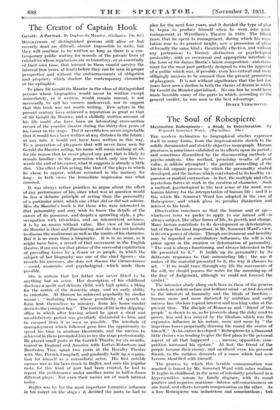The Creator of Captain Hook Gerald: A Portrait. By Daphne
du Maurier. (Gollancz. 10s. ad.) BIOGRAPHIES of distinguished persons still alive or but recently dead are difficult, almost impossible to write, but they will continue to be written so long as there is a con- temporary public waiting for records of the private lives of celebrities whose reputations are so transitory, or so essentially of their own time, that interest in them cannot survive the interval (ten years, at least) before they can be seen in proper perspective and without the embarrassments of obligation and propriety which shadow the contemporary chronicler or the epitaphist.
To place Sir Gerald du Maurier in the class of distinguished persons whose biographies would never be written except immediately, or if written, would remain unread, is not necessarily to call his success undeserved, nor to suggest that this book was not worth writing. Few actors in the present century have achieved a reputation as great as that of Sir Gerald du Maurier, and a skilfully written account of his life could also have been an interesting cross-section record of the popular theatre during the thirty-five years of his career on the stage. But it nevertheless seems improbable that it would have been written at any distance in the future : at any rate, it would not have been written in this way. To a generation of playgoers that will never have seen Sir Gerald du Maurier acting, his name will mean nothing at all, for the reason that he never played any part that is likely to remain familiar : to the generation which only saw him to- wards the end of his career, what it suggests is already a little dim. The effect of his acting, like that of the plays in which he chose to appear, seldom remained in the memory for long : in both cases the immediate impression was what counted.
It was always rather pointless to argue about the effect of any performance of his, since what was at question would be less a definite principle of acting than the personality of a particular actor, which one either did or did not admire. Miss du Maurier's book is for those who were interested in that personality and may wish to know the details of the career of its possessor, and despite a sprawling style, a pre- occupation with trivialities, and an intermittent archness, it is by no means without value. Her view of Sir Gerald du Maurier is clear and illuminating, and she does not hesitate to-discuss the weaknesses as well as the merits of his character. But it is no more than a biography. It is in no sense, as it might have been, a record of that movement in the English theatre, if one can use that phrase of the successful exploitation of prevailing tastes by a dozen or so people, in which the- subject of her biography was one of the chief figures : she records his successes, she does not discuss the circumstances —social, economic, and psychological—which made them possible.
She is certain that her father was never fitted to be anything but an actor. Her description of his childhood discloses a spoilt and delicate child, with high spirits, a liking for the centre of the domestic stage, and an early ability to entertain. At Harrow he achieved popularity by similar means : " imitating those whose peculiarity of speech or form lent themselves to mimicry, from his house-master down to the youngest fag." The routine of life in the shipping- office in which after leaving school he spent a short and unsatisfactory period was peculiarly distasteful to him, and he escaped from it as soon as possible. The interlude of unemployment which followed gave him the opportunity .to spend his time in amateur theatricals, and the success he achieved in them persuaded him to try the stage professionally. He played small partS at the Garrick Theatre for six months, toured in England and America with Forbes-Robertson and Beerbohm Tree, spent two years at the Royalty Theatre with Mrs. Patrick Campbell, and gradually built up a reputa- tion for himself as a naturalistic actor. His first notable success was as the hero-crook in Raffles, and once the popular taste for this kind of part had been created, he had to repeat the performance under another name in half-a-dozen different plays. Not even their names are of much interest today.
Raffles was by far the most important formative influence in his career on the stage : it decided the parts he had to.
play for the next four years, and it decided the type of play he began to produce himself when he went into joint- management at Wyndh.am's Theatre in 1910. The fifteen years that he spent in management, during which his repu- tation rose to its greatest height, saw a procesSion of plays of broadly the same kind : theatrically effective, and without any pretensions to literary distinction or psychological profundity, with an occasional and appropriate, interlude in the form of Sir James Barrie's latest composition—entertain- ment for the most part perfectly designed to win the approval of a public which was, if possible, even less critical and more obligingly anxious to be amused than the present generation of playgoers. It is not without significance that the last few years have seen a decline in both the classes of drama in which Sir Gerald du Maurier specialized. No one but he could have made bearable many of the parts in which, according to the general verdict, he was seen to the best advantage.
DEREK VERSCHOIME.














































 Previous page
Previous page